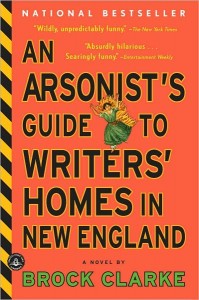I don’t actually want to tell you anything about Brock Clarke’s novel An Arsonist’s Guide to Writers’ Homes in New England. I want you to go read it and then meet me at Sweetwaters in Ann Arbor, so we can talk about our favorite parts while sipping mocha lattes and nibbling cranberry scones. This type of behavior—informally discussing books in settings seemingly created for the informal discussion of books—is something that Clarke makes fun of in the novel, but then again, he makes fun of pretty much anyone who likes books, or talks about books, or thinks they are at all important. A significant feat, considering the fact that Clarke obviously reads tons of books, and loves them, and thinks they’re at least important enough to spend a few years writing a pretty good one.
But reviews must describe, summarize, essentialize. We press on.
Sam Pulsifer, arsonist and (possibly) accidental murderer, is the confessor, narrator and protagonist of An Arsonist’s Guide to Writers’ Homes in New England. Sam is incarcerated for burning down the Emily Dickinson House in Amherst, Massachusetts, trapping two people in the upstairs bedroom who, caught in flagrante delicto, are killed in the fire. Sam spends a decade in a minimum security prison, where he helps a group of ambitious bond analysts write their memoirs. Once he gets out, Sam gets married, has a pair of kids, settles into the rhythms of a new life in a cookie-cutter development on the outskirts of Amherst, the town where his parents—who his new family believes are dead—still live together. Sort of.
Things go swimmingly for Sam until the son of the couple who were killed in the Dickinson House fire shows up on his front porch. Shortly after, Sam’s families find out about the past(s) he’s hidden from them. Other literary landmarks around New England go up in flames. Mystery and hilarity ensue.
Arsonist’s Guide could have been a funny but secretly maudlin book about how no one reads the great masters anymore, how no one cares about literature, thereby fulfilling our expectations of what a part of the writing establishment thinks he is supposed to say, or what we expect to hear, about our disintegrating literary culture. But Clarke goes the other way, using the premise to find the people who still read and unearth their (mostly selfish) motivations for doing so: exhausted academics, glamour-seeking editors, parents trying to understand children, children seeking approval from parents, laymen clinging to some romantic ideal that manifests itself in the barely veiled wish fulfillment encoded in most contemporary fiction. Beneath Pulsifer’s self-interrogating and the flaming timbers of New England’s literary landmarks, important questions—are books good for us? are we better for reading?—smolder. And Clarke, correctly, refuses to provide answers. As we pull into the closing 50 pages of the book, the questions and commentary slip into the background, and Pulsifer and his plot move back into the foreground, ensuring that the novel lands safely, satisfyingly. Arsonist’s Guide is, first and last, a ripping yarn. The reader—appropriately—is left to unearth or create any lessons on her or his own. Except, maybe, Don’t burn down houses. That one he pretty much gives to us.
So what do you say, next Monday, Sweetwaters, meet in the back? Caramel marshmallows are on me.
Further Resources
– An excerpt from Arsonist’s Guide
– Brock Clarke’s blog
– The story behind his relationship with writers’ homes
– Bookslut’s September 2007 interview with the author






